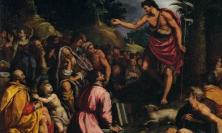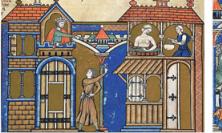‘There is no aspect of human life where God is not present, but that way of being present often confounds our expectations and preconceived notions of the divine.’ Gemma Simmonds CJ, the writer of Pray As You Go and Sacred Space’s 2020 Advent retreat, invites us to embrace the presence of a God who responds, often unexpectedly, to our desire for an encounter with him – a God who is always with us, as we shall see in a series of reflections on Thinking Faith this Advent.
What great nation has its gods as near as Yahweh our God is to us whenever we call to him? And what great nation has laws and customs as upright as the entirety of this Law which I am laying down for you today? But take care, as you value your lives! Do not forget the things which you yourselves have seen or let them slip from your heart as long as you live; teach them, rather, to your children and to your children's children. (Deuteronomy 4:7-9)
In every age, within whatever system of belief, human beings have reached out in search of the Other. This quest for encounter with God is something more than the primitive desire of cave-dwellers for warmth and light to keep the shadows at bay. It is driven by a thirst for meaning and a longing for intimacy. Our deepest fears, hopes and dreams draw us to seek God-with-us, as does our capacity to aspire to something greater than the here and now.
There is no aspect of human life where God is not present, but that way of being present often confounds our expectations and preconceived notions of the divine. The season of Advent shines a focused spotlight on this whole process of longing, seeking and finding, but also on our expectations confused and confounded by a response entirely unimagined.
Ignatius lived this after the collapse of his fantasies of military glory at Pamplona. What he learned during his long convalescence in Loyola and on his subsequent pilgrim journey to Manresa became the bedrock of his approach to imaginative contemplation of the Scriptures in which he got in touch with deep desires beyond the ephemeral fantasies and attractions to which his ego was drawn. He learned to discern the same voice of God that sounds throughout salvation history with an invitation to dare to encounter the source of our deepest meaning and embrace life in its unpredictable fullness.
Advent takes us by incremental steps through the story of God’s self-revelation in history, as one biblical figure after another learns who it is she or he is dealing with: a God who invites intimacy but who also challenges us to move beyond the limitations of our concept of the holy. The God who joins Adam and Eve for companionable walks in the cool of the evening and haggles with Abraham over the number of righteous to be found in Sodom also warns Moses: ‘Come no nearer […] take off your sandals, for the place where you are standing is holy ground’ (Exodus 3:5). God is with us, but not as a cosy figure of childhood reassurance. God cannot be tamed or domesticated and will be who God will be, irrespective of our projections.
The Advent story reminds us of what happens when we try to bend God to our own will. As Ignatius experienced in the cave of Manresa, the God who is near whenever we call also allows us to experience our radical emptiness outside the one relationship which gives all others meaning. The Advent call of the O Antiphons is a declaration of hope while also the appeal of human desolation without a sense of God-with-us. But that very desolation and hunger portend a gift. Augustine of Hippo, the patron saint of desire if ever there was one, writes:
The whole life of a good Christian is holy desire. What you desire you cannot see yet. But the desire gives you the capacity, so that when it does happen that you see, you may be fulfilled… this is our life, to be exercised by desire.[1]
Aquinas follows on from this: ‘The greater the love, the greater the desire. And desire in some sort prepares and opens the one who desires to receive the one who is desired.’[2]
Ignatius repeatedly urges us in the Spiritual Exercises to name our desire, not because otherwise God might not recognise what it is we deeply need, but because we might not. Advent is always a time for clarifying what is at the heart of our greatest needs. In a time of pandemic, this has never been so urgent.
Gemma Simmonds CJ is Director of the Religious Life Institute at the Margaret Beaufort Institute in Cambridge.
‘God is with you’, the Advent 2020 retreat from Pray As You Go and Sacred Space, is available at:
[1] St Augustine, Homily on the First Letter of John, 4,6,2.
[2] St Thomas Aquinas, Summa Theologica, 1.q.12.






